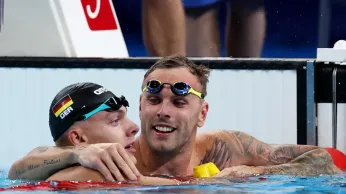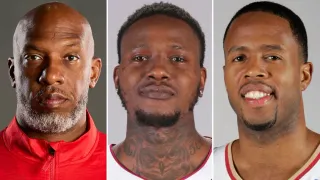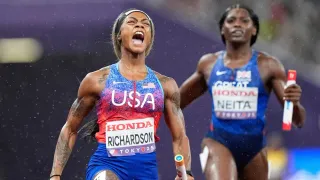
Oct 23
Swimming Australia Urges Meta to Remove More Fake Anti-LGBTQ+ Quotes Falsely Attributed to Kyle Chalmers
READ TIME: 15 MIN.
Swimming Australia has again appealed to social media conglomerate Meta to swiftly remove a series of fabricated anti-LGBTQ+ statements that have been falsely attributed to Olympic gold medalist Kyle Chalmers. The false posts, circulating widely on platforms including Facebook and Instagram, claim Chalmers made derogatory comments regarding LGBTQ+ participation in sport and threatened to withdraw from the Australian swim team if tickets were sold to LGBTQ+ fans—a claim that has no basis in fact and has been roundly denounced by both Chalmers and Swimming Australia .
This incident marks the latest in a series of attacks targeting high-profile athletes and LGBTQ+ inclusion in sport, raising urgent questions about platform responsibility, online hate, and the wellbeing of both athletes and LGBTQ+ Australians.
The current wave of fabricated quotes appears to be part of a broader pattern of misinformation campaigns designed to sow division and undermine support for LGBTQ+ rights in sport. In previous years, similar tactics have been used to falsely attribute inflammatory remarks to athletes, often with the aim of provoking backlash or intimidating advocates of inclusion .
Kyle Chalmers, who has repeatedly voiced his support for diversity and inclusion in sport, has been a particular target for such disinformation campaigns. False statements attributed to him have included fabricated anti-LGBTQ+ rhetoric and threats to boycott events—statements which Chalmers and his management have unequivocally denied .
In response, Swimming Australia has reiterated its commitment to supporting LGBTQ+ athletes and fans, emphasizing that the organization"condemns with the strongest terms any attempt to misrepresent our athletes or undermine inclusion in Australian sport" .
Swimming Australia’s appeal to Meta comes amid growing scrutiny over how social media platforms respond to hate speech, misinformation, and harassment targeting LGBTQ+ people. According to digital rights organizations and LGBTQ+ advocacy groups, efforts by platforms to quickly identify and remove false and harmful content remain inconsistent, often leaving individuals and communities exposed to harm for extended periods .
In this case, the fabricated posts not only misrepresent Chalmers but also contribute to a hostile environment for LGBTQ+ athletes and fans."Online misinformation doesn’t just damage reputations—it endangers people’s safety and wellbeing," said a spokesperson for Australian LGBTQ+ advocacy group Equality Australia ."We call on platforms like Meta to act swiftly and decisively to remove harmful lies and prevent their spread."
Meta has stated publicly that it prohibits hate speech and misinformation on its platforms, and that it encourages users to report false or harmful content for review . However, critics argue that current enforcement mechanisms are inadequate and often rely too heavily on user reports rather than proactive monitoring .
The continued circulation of false statements has had a personal impact on Kyle Chalmers, who has in the past spoken publicly about his commitment to inclusion and the challenges of being targeted by online abuse . Chalmers’ management has reiterated that he supports all athletes' right to participate safely and respectfully, regardless of sexual orientation or gender identity.
For LGBTQ+ Australians, the episode underscores persistent risks associated with social media misinformation—including the potential for increased harassment, mental health impacts, and erosion of trust in safe sporting spaces."When high-profile athletes are targeted with these kinds of lies, it sends a chilling message to LGBTQ+ people about their place in sport and society," said a spokesperson for Pride in Sport, a national LGBTQ+ sporting inclusion program .
Swimming Australia has reaffirmed its commitment to fostering a safe, welcoming environment for all athletes and fans. In its latest statement, the organization called on media and social media companies to"take responsibility for the content shared on their platforms and to work collaboratively with sporting bodies to combat disinformation and hate" .
This incident is not isolated. Internationally, LGBTQ+ athletes and advocates have faced similar waves of targeted disinformation and harassment, particularly as debates over inclusion in sport have intensified . Human rights organizations have warned that such tactics are being used not only to damage individual reputations but also to undermine broader movements for equality.
Swimming Australia has indicated that it will continue to work with Meta and other partners to ensure that false and hateful content is promptly removed, and that Australian sport remains a leader in inclusion and diversity .
For Chalmers and countless others, the fight against misinformation and online hate is inseparable from the broader struggle for equality in sport and society. As platforms, policymakers, and communities grapple with the challenges of the digital era, the call for accountability and respect will remain at the heart of the movement for LGBTQ+ inclusion in Australian sport and beyond.






